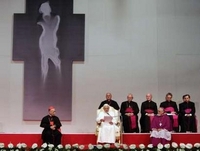I’m going to be working on that tip sheet. Part of it will have to be left open until we actually, you know…have a document. It occurred to me that the Pope will probably have a preferred way of referring to "it" in the document, which will help.
Anyway, here’s some links:
Excellency, the first public action of your Secretaryship for the Congregation of Divine Worship was a conference held on the occasion of the presentation of a book by Uwe-Michael Lang, Oratorian of German origin and resident in London, Turning toward the Lord (Cantagalli, Siena 2006, pp. 150, euro 14.90), which came out on 27 April under the auspices of the Patristic Institute of Augustine of Rome. The volume, issued in German in 2003, contains a preface by then-Cardinal Joseph Ratzinger, published for the first time in Italian sul numero of March 2004 of 30Giorni. How did you come upon this book?
RANJITH: I had already read this book and the beautiful preface by then-Cardinal Ratzinger. So when I received the invitation, I immediately accepted. Because it was the occasion for give birth to a very positive debate in the Church. One speaks much of the participation of the faithful in the liturgy. But do the faithful participate more if the priest celebrates facing the people (versus populum) or if he celebrates facing the altar (verso l’altare); it may be that in this case the people detach (si distragga). And is it true participation when, at the sign of peace, in the church one creates a great confusion when some priests sometimes go to give their salutations all the way to the last pew? Does this speak of actuosa participatio, greatly desired by the Second Vatican Council, or simply of a great distraction that helps not at all to follow with devotion the succeeding moments of the Mass – such that at times one forgets even to declaim the Agnus Dei… I repeat, the book by Father Lang was, and is, an extremely useful provocation, right from the introduction, in which Cardinal Ratzinger remembers that the Council never asked to abolish Latin or to revolutionize the direction of liturgical prayer…
John Allen interviewsViatorian Fr. Mark Francis, superior general of the Clerics of St. Viator:
[he]spelled out at least seven questions that occur to him in an Oct. 17 interview with NCR:
• Aside from the Mass itself, will priests also be expected to offer other sacraments according to the pre-Vatican II rites, such as funerals, weddings, and baptisms? If many priests lack familiarity with the older Mass, even fewer would feel at ease with more “occasional” sacraments;
• Will liturgical preparation in seminaries need to be revised? “If there is going to be a universal indult, then seminaries would feel honor-bound to offer courses to prepare priests to celebrate both rites,” Francis said.
• What about church architecture? “It’s difficult to celebrate the Tridentine rite in a Vatican II space,” Francis said. “Will we have to move the altars back and forth? Will we have to install altar rails?”
• Assuming the liberalization applies to the 1962 version of the Roman Missal, the last before Vatican II, where will people find it? It would have to be reprinted and distributed quickly, Francis said – joking that in the end, the 1962 Missal might make the rounds more quickly than the new English translation of the post-Vatican II Mass, a project that has been in the works for the better part of a decade.
• Will the normal expectation be for celebration of the “low Mass” according to the older rite, or the far more complex “high Mass?” If the latter, then various other ministers and a choir conversant in older musical scores, at a minimum, would be required, and that could be problematic in many places.
• Will some of the older disciplines that surrounded the pre-Vatican II rite be restored, such as Benediction after Mass, which is actually forbidden under current liturgical law? In some cases, the older Mass was celebrated in the presence of the exposed sacrament, also currently prohibited. How will such canonical conflicts be sorted out?
• Finally, if the church allows traditionalists attached to the old Mass to hold onto their customs despite official changes in policy, what would prevent more liberal Catholics, for example, who oppose the new, more “Roman” English translation of the post-Vatican II Mass from requesting permission to use the previous English version? “Are we creating a procedural monster?” Francis asks.
When presented with evidence that his priests were raping children, Catholic bishop Tod D. Brown did what most of his predecessors in the Diocese of Orange had done before him: nothing.
But when it comes to a bunch of septuagenarians attending the Mass in Latin, Brown is suddenly George W. Bush engaged in a war on terror.
Arellano has done intense, unrelenting work for the OCWeekly over the past years, exposing the corruption in the OCDiocese. He’s a fairly bitter ex-Catholic, and this little piece has some points that are incorrect and is, once again, confusing about the the status of the independent chapel, which he constantly calls "Help of Christians" instead of "Our Lady, Help of Christians." It’s an odd shorthand.
But there it is – and what’s interesting is that the article is discussed over at Roman Catholic Blog and the first commentor is Arelleno himself.

